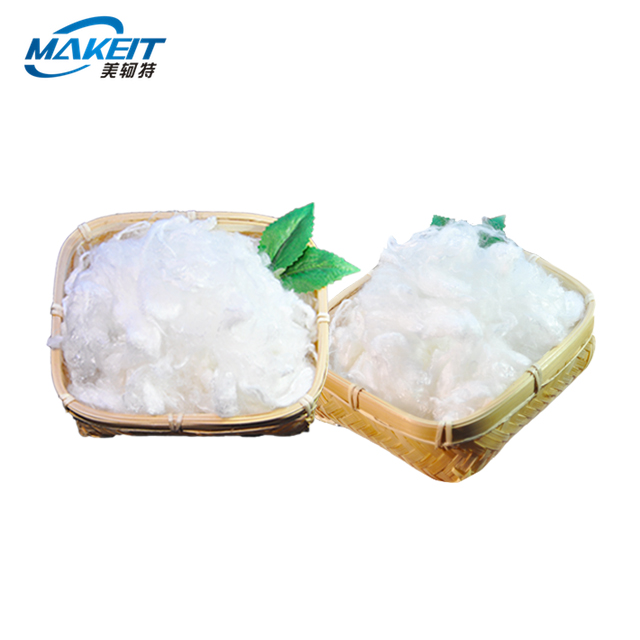Introduction
In today’s rapidly evolving textile industry, bamboo fiber is revolutionizing sustainable textile solutions by offering a powerful alternative to synthetic and non-biodegradable materials. With growing concerns about environmental degradation and the urgent need for clean, renewable resources, bamboo fiber stands out as a versatile, eco-conscious option for manufacturers. At the forefront of this green shift is SuZhou Makeit Technology Co., Ltd, a trusted supplier driving innovation through high-quality fiber production and sustainable practices.

1. What Makes Bamboo Fiber a Game-Changer?
Bamboo fiber is derived from natural bamboo pulp, making it biodegradable, breathable, and gentle on the environment. Unlike conventional polyester or other synthetic materials, it breaks down naturally without leaving toxic residues. It also requires less water and fewer chemicals during processing compared to cotton or viscose. These characteristics make bamboo fiber ideal for companies aiming to reduce their carbon footprint while maintaining product performance.
2. A Sustainable Shift Led by Industry Innovators
Makeit & Meijie, founded in 2007, recognized the potential of green materials early on. While known for their large-scale production of PET staple fibers, the company has expanded into bio-based materials like bamboo fiber, PLA fiber, and viscose staple fiber in response to the global demand for sustainable alternatives. With over 200 employees and a factory covering 20,000 square meters, Makeit continues to lead in both scale and sustainability.
Backed by certifications including OEKO-TEX STANDARD 100, SGS, and GRS, their products are not only environmentally responsible but also meet global quality standards. This makes them a trusted supplier for textile businesses across Southeast Asia, Europe, and the Americas.
3. Key Benefits of Bamboo Fiber in Textiles
-
Eco-Friendly and Renewable: Bamboo grows rapidly without the need for fertilizers or pesticides. Its regenerative properties make it one of the most renewable raw materials on the planet.
-
Biodegradable: Bamboo fiber decomposes naturally within months, contributing to a closed-loop, waste-free supply chain.
-
Soft and Hypoallergenic: Its natural softness and antimicrobial properties make it perfect for skin-contact fabrics like clothing, bedding, and baby products.
-
Thermal Regulation: Bamboo fiber fabrics offer excellent breathability and moisture-wicking properties, improving user comfort across all climates.
-
Strong and Durable: Despite its softness, bamboo fiber maintains strength and durability, which is crucial for industrial textile use.
4. Real-World Applications Driving Change
Bamboo fiber is gaining momentum in various textile applications:
-
Apparel Industry: Used in everything from eco-friendly fashion to sportswear, bamboo fabrics are increasingly preferred by brands promoting sustainability.
-
Home Textiles: Its natural antibacterial qualities make it perfect for towels, sheets, and pillowcases.
-
Industrial Use: More manufacturers are incorporating bamboo into nonwoven materials, filtration fabrics, and automotive interiors as part of their sustainability roadmap.
With advancements in fiber-blending technology, bamboo can also be mixed with other bio-fibers to enhance specific properties, opening even broader application potential.
5. Bamboo Fiber vs Traditional Fibers: A Clear Advantage
When compared with traditional fibers like polyester and cotton, bamboo fiber offers significant advantages:
| Feature | Bamboo Fiber | Polyester | Cotton |
|---|---|---|---|
| Biodegradable | Yes | No | Yes |
| Water Consumption | Low | Moderate | High |
| Chemical Use | Minimal | High (during dyeing) | High (fertilizers) |
| Comfort & Breathability | Excellent | Low | Moderate |
This clear edge has positioned bamboo fiber as a strategic material for manufacturers aligning with global ESG and carbon-reduction goals.
6. Why Work with Makeit for Bamboo Fiber Supply?
Choosing the right supplier is critical to successful material integration. Makeit combines over 17 years of experience in fiber development with an unwavering commitment to sustainability. Their ability to produce high volumes with consistent quality makes them a reliable partner for long-term sourcing.
By investing in eco-friendly materials like bamboo fiber, Makeit not only meets current market demands but also supports future-oriented innovations—ideal for companies looking to build green, high-performance product lines.
7. The Future of Sustainable Textiles Starts with Bamboo
As the textile world transitions toward greener practices, bamboo fiber is revolutionizing sustainable textile solutions by offering a rare blend of performance, comfort, and environmental responsibility. Manufacturers who embrace bamboo today are positioning themselves ahead of both regulatory trends and consumer expectations.
Whether you're a product developer, textile engineer, or brand sourcing expert, bamboo fiber is no longer a niche—it's a necessity. With suppliers like Makeit paving the way, the shift toward sustainable, bio-based materials has never been more accessible or impactful.
Interested in exploring bamboo fiber for your next project? Let’s talk about how this eco-smart material can transform your production line.
www.makeitfiber.com
SuZhou Makeit Technology Co., Ltd
